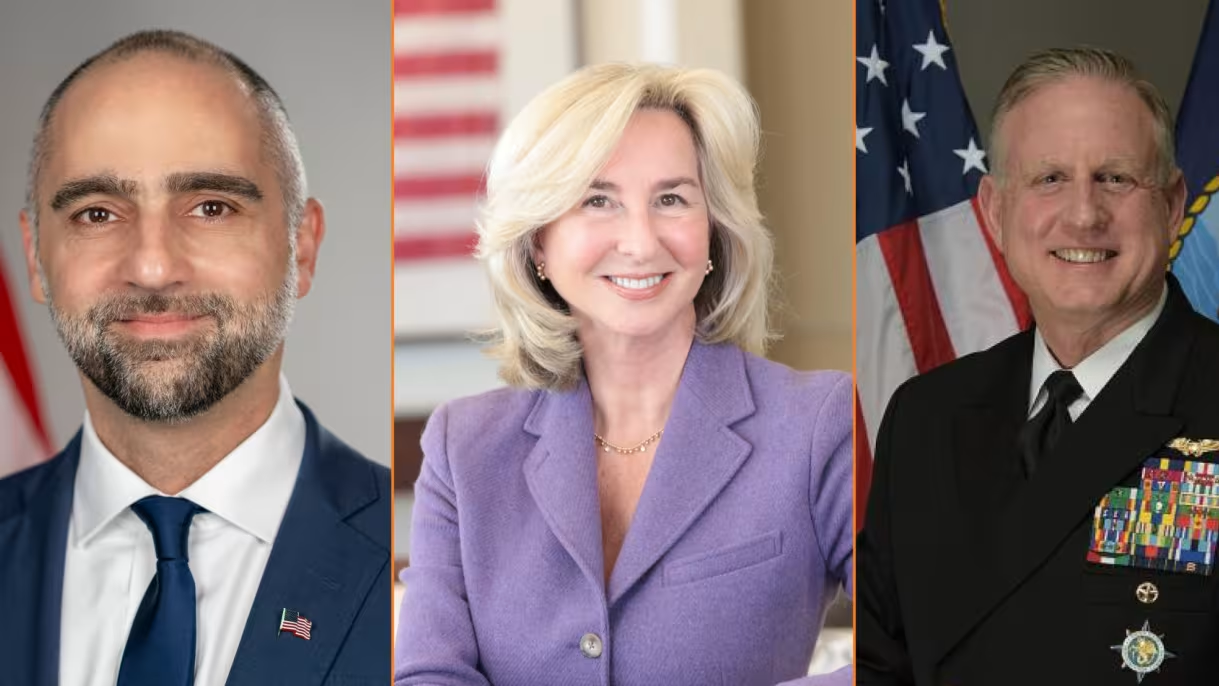

Leadership Lessons: Training Tomorrow’s Policymakers
Ali Nouri’s resume includes leadership roles in the White House, the U.S. Department of Energy, the U.S. Senate, the United Nations, and the Federation of American Scientists. Kerry Healey is a former lieutenant governor of Massachusetts, a president emerita of Babson College, the executive chair of the Forward Party, and a co-chair of the Council for Responsible Social Media. Dee Mewbourne, a retired U.S. Navy vice admiral, commanded three nuclear-powered aircraft carriers and two carrier strike groups and currently serves as CEO of a company that provides advanced reactor fuel and integrated services for the nuclear power industry.
The significant depth and breadth of these experiences form the foundation of a pair of leadership classes the three are teaching to Princeton School of Public and International Affairs graduate students.
“Leaders are who determine our future,” says Healey, a lecturer at Princeton SPIA. “And we all need to lead in whatever organization we're in. This is really an opportunity for our students to pause, to assess themselves, to assess what they've seen in the behaviors of others in the past, and to decide who they want to be moving forward.”
In “Values Based Leadership,” Healey and Mewbourne, a visiting lecturer at the School, focus on the qualities, tools, and actions of effective leaders. Using materials ranging from Machiavelli’s “The Prince” to the documentary film “Enron: The Smartest Guys in the Room,” they teach that leadership comes in many different varieties and can be applied in many different ways. Students are encouraged to examine and reflect upon their own leadership experiences and aspirations through various lenses, with their capstone project being the creation of a personal leadership portfolio comprising a statement of leadership values and philosophy, a decision-making framework, a personal narrative, and goals for leadership development.
“I want them to walk away understanding that leadership is a journey and that it's a practice,” says Mewbourne, comparing it to medicine and golf. “It takes a lifetime to get really good at it. Maybe you'll never become the doctor or the golfer that you really want to be, but every day you're going to try. What I want them to do is to think about it as a practice, that they're going to commit their life to become that leader they want to become.”
While “Values Based Leadership” offers a general overview, Nouri’s “Leadership in Policymaking” takes a more focused approach, delving into the policymaking process that led to landmark climate legislation, landmark industrial policy for semiconductors, and the development of AI governance policies during the Biden administration.
“These issues are constantly on the forefront of policymakers' minds,” says Nouri, a Princeton SPIA lecturer. “The idea behind this class is that we need to train the next cohort of leaders to have an understanding of both the technical policy as well as the political dimensions of these issues to prepare them for these future leadership jobs.”
Relying heavily on case studies, Nouri is presenting the various attributes he believes contribute to leadership, including the ability to rise to the occasion, the recognition that essential things need to be done, the power of persuasion, charisma, and grit, among others.
“My goal is for the students to understand that when it comes to policymaking, It is a very crowded area with numerous agendas and numerous goals,” he says. “And I want them to understand that the people who win in that crowded field are the people who embody those qualities. Through these case studies, they learn about how individuals who had those attributes were able to succeed. They can home in and develop those qualities on their own, and they will be more successful policymakers and leaders in the future.”
Each course is in its second year, and each has proved popular. “Leadership In Policymaking” was capped at 16 students last year, but because of high demand, 25 took the class. “Values Based Leadership” is the first common required course for the School’s Master in Public Policy cohort.
“We're trying to help the students have the intellectual framework necessary to know themselves,” Healey says. “We're not telling them this is the right way to do it or you must have this style of leadership or you must possess these skills or these. We’re saying, which of these things feels most authentic to you? And which ones can you draw on at different moments in your career? We’re trying to lay out the array of possibilities of different tools and traits that you might use over time, and hopefully they'll remember them when the time comes.”

